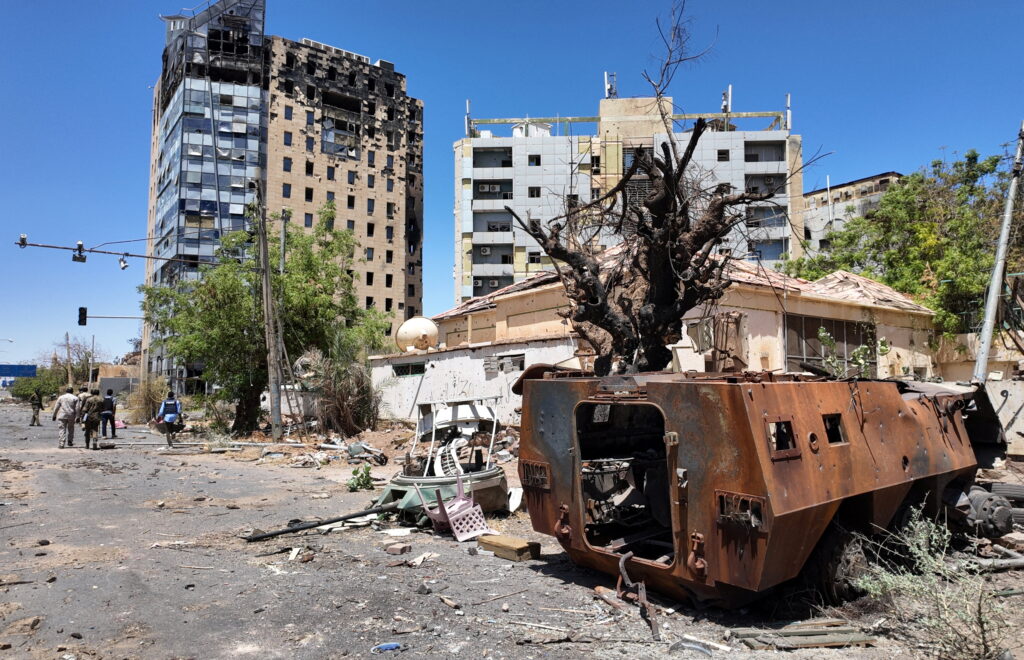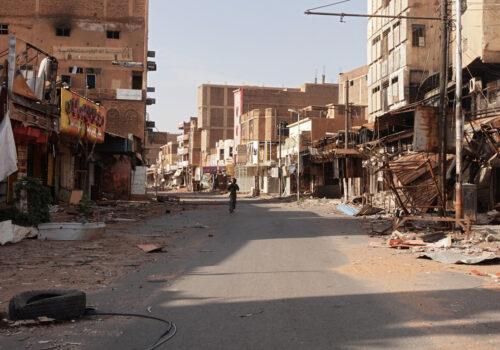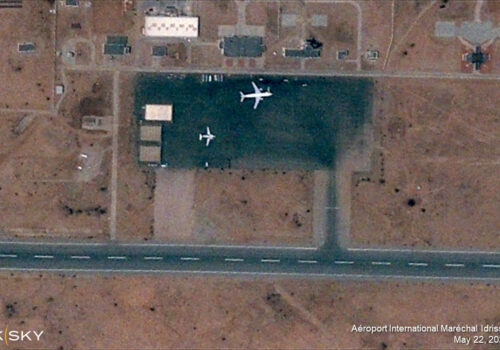Last week, US President Donald Trump posted on Truth Social that Sudan “has become the most violent place on Earth” and that he and Saudi Crown Prince Mohammed bin Salman had talked about the United States using its influence to “bring an immediate halt to what is taking place in Sudan.”
Such a statement comes after unproductive attempts by Washington to mediate the conflict. It also isn’t clear how the president would bring a halt to the situation, since both sides in the fighting are supported by US partners. But Trump is waking up to the reality of what is happening in Sudan—and he’s not the only one.
On October 27 this year, two and a half years into the Sudanese civil war, the international community seemed to finally grasp that a genocide was unfolding in front of its eyes. After enduring an eighteen-month blockade marked by relentless drone strikes, the city of El Fasher, the final major urban center in Sudan’s North Darfur state outside the grip of the Rapid Support Forces (RSF), was overrun. The RSF is the paramilitary faction that has been at war with the Sudanese Armed Forces (SAF) since April 2023.
Once the group pushed into El Fasher, reports and footage circulating across social media and television revealed widespread killings of civilians. Around 1,500 people were killed and some ninety thousand displaced, with another fifty thousand fleeing violence in the neighboring North and South Kordofan provinces, according to the Sudan Doctors Network and the United Nations.
El Fasher had long been one of the most violent fronts in the devastating conflict between Sudan’s national army and the RSF. In April, the paramilitary group had intensified its offensive on the city, shortly after being driven out of the capital, Khartoum.
The world’s most serious humanitarian crisis
For years, the genocide unfolding in Sudan barely registered on the world’s radar. The international community remained more focused on crises in the Middle East and the war in Ukraine. But the fighting and killing in Sudan never stopped.
In a country in tatters, where there is no systematic record of the dead, casualty estimates vary. Some sources suggest that the number hovers somewhere around 150,000. However, human rights organizations believe that the real toll of the civil war is likely much higher. The conflict has displaced about fourteen million people out of a population of fifty-one million. Half of them are refugees in neighboring countries. As of April 2025, twenty-five million Sudanese were facing acute famine—and according to Doctors Without Borders, over 70 percent of children under the age of five were acutely malnourished. Among those who fled El Fasher, 35 percent suffered from “severe acute malnutrition.”
With severe damage to its hospitals and water supply, Sudan now faces one of the world’s gravest humanitarian crises—one that some experts say even eclipses the emergencies in Gaza and Ukraine. Still, El Fasher is not the first, but merely the latest genocidal campaign in the country.
Naming the genocide
Engaging in war crimes and crimes against humanity, RSF soldiers have carried out child abductions, mass rape, sexual slavery, and village burnings for years, mostly in Darfur in western Sudan. Even as far back as 2001, the predecessor of the RSF—a militia known as the Janjaweed—repeatedly looted homes and engaged in gang rape in the region. Between 2003 and 2008, the group killed hundreds of thousands of non-Arab civilians. The campaign displaced around three million people and was described as a “genocide” by US President Joe Biden just before leaving the White House and as a “ethnic cleansing” by international observers. Against this background, Darfur is not a newly emerging hotspot. Home to several long-persecuted non-Arab tribes—Fur, Masalit, Berti, and Zaghawa—it is, in fact, again becoming one.
The Zaghawa, who are the majority group in El Fasher, rallied to the army in late 2023 after the RSF committed massacres against the Masalit and other non-Arab communities in the city of El Geneina in West Darfur. In a report released in May 2024, Human Rights Watch documented these killings as ethnic cleansing. The report cited the testimony of a seventeen-year-old boy who described the murder of twelve children and five adults from several families: “Two members of the RSF… tore the children from their parents and, as the parents began to scream, two other members of the RSF shot and killed the parents. Then they piled the children up and shot them. They threw their bodies into the river, along with their belongings.”
African apathy—and cynical regional powers
With its paltry communiqués, a powerless African Union has, for two years, contented itself with calling for an end to the fighting or expressing its concern about the humanitarian crisis, without ever sending a single African head of state to the front lines in Khartoum or to visit the victims of the El Geneina massacre.
In a press release marking two years of conflict, Amnesty International noted that “the world has only contributed 6.6% of the funds needed to address the humanitarian catastrophe raging in the country.” Observers usually recommend enforcement of the arms embargo, increased emergency humanitarian aid, and justice for the victims. However, there is one issue on which the United Nations Security Council and the mediators remain discreetly, if not embarrassingly, silent: the armed support that the belligerents receive from regional powers.
Egypt, Iran, Turkey, China, the UAE, and even Russia and Ukraine have all turned their attention to Sudan, siding either with the SAF or the RSF. Drones, gold, military intelligence, and mercenaries are all being used to intensify the violence of the war, while the meddling regional powers deny any involvement. Motivations for their involvement include securing the Nile’s waters, controlling the eight hundred kilometers of Sudanese Red Sea coastline, and the mineral resources of eastern Sudan. Sudan has also accused Chad and Kenya of being parties to the conflict. At the London Sudan Conference on April 15, the second anniversary of the outbreak of the civil war, Sudanese Foreign Minister Ali Youssef reiterated these allegations.
Clearly, the complex web of geostrategic interests in the region makes any mediation difficult, with Sudan even considering taking action against the UAE before the International Court of Justice for supplying the RSF with weapons.
The people as a solution
As it stands, Sudan is trapped in a dangerous regional power play and is threatened with partition. Should the country fall apart, this would not only destabilize the African continent but also endanger the exceptional Sudanese cultural heritage.
Any solution in Sudan must run through its civil society and, ultimately, its people. They are strong in part because of—and shown by—their history. With eight borders and a geostrategic position between the Sahel and the Horn of Africa, Sudan is a crossroads of African cultures, religions, and civilizations. The country still bears a name that means “land of the Blacks,” despite the attempts to erase its African roots carried out by the Islamist regime of long-time dictator Omar al-Bashir. Sudan, which rivaled ancient Egypt, eventually conquered and ruled the Egyptian throne, becoming the twenty-fifth dynasty of pharaohs. All this happened a long time ago, under Black African leadership, before Christians and Muslim Arabs expanded their influence in the country.
This history and legacy help explain the political resilience of the Sudanese people and the dynamism of Sudan’s civil society. Bashir’s ousting in 2019 would not have been possible without democratic resistance, embodied by civic organizations such as the Sudanese Professionals Association, the nonviolent Forces of Freedom and Change coalition, and the grassroots Girifna movement.
Today, as in the past, the Sudanese people—rather than an apathetic international community or meddling regional powers—could once again be the decisive force for change. Empowering civil society and grassroots organizations should therefore be the starting point for any diplomatic initiative.
Rama Yade is the senior director of the Atlantic Council’s Africa Center.

The Africa Center works to promote dynamic geopolitical partnerships with African states and to redirect US and European policy priorities toward strengthening security and bolstering economic growth and prosperity on the continent.
Further reading
Tue, May 28, 2024
Sudan is an abject disaster. Is anyone listening?
AfricaSource By Benjamin Mossberg
US efforts in Sudan are not working. Additional visibility and attention can hopefully bring about solutions.
Tue, Dec 17, 2024
Sudan is caught in a web of external interference. So why is an international response still lacking?
MENASource By Emadeddin Badi
Sudan needs a unified international strategy, combining economic, political, and diplomatic pressure.
Mon, Nov 24, 2025
In Mozambique, US economic priorities hinge on security investments
AfricaSource By Rose Keravuori, Maureen Farrell
US-backed gas and mining projects could transform Mozambique’s economy, yet persistent terrorist violence threatens progress. Targeted security partnerships offer a path to protect communities and safeguard investments.
Image: A destroyed military vehicle and bombed buildings in Khartoum. Source: REUTERS/El Tayeb Siddig




